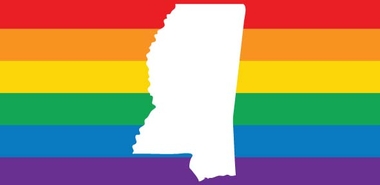Court clears Mississippi LGBT objections law; appeal likely

JACKSON, Miss. (AP) — A federal appeals court said Thursday that Mississippi can start enforcing a law that allows merchants and government employees cite religious beliefs to deny services to same-sex couples, but opponents of the law immediately pledged to appeal.
A three-judge panel of the 5th U.S. Circuit Court of Appeals reversed a judge's decision that had blocked the law.
U.S. District Judge Carlton Reeves had ruled that the law unconstitutionally establishes preferred beliefs and creates unequal treatment for LGBT people. His ruling prevented the law from taking effect last July.
The appeals court said plaintiffs failed to prove that they would be harmed by the law, which started as House Bill 1523 . Legal experts said it is the broadest religious-objections measure enacted by any state.
The law championed and signed in 2016 by Republican Gov. Phil Bryant sought to protect three beliefs: marriage is only between a man and a woman; sex should only take place in such a marriage; and a person's gender is determined at birth and cannot be altered. It would allow clerks to cite religious objections to recuse themselves from issuing marriage licenses to same-sex couples, and would protect merchants who refuse services to LGBT people. It could affect adoptions and foster care, business practices and school bathroom policies.
Robert McDuff, an attorney for some of the people who sued to try to block the law, criticized the appeals court for saying plaintiffs had failed to show they would be harmed.
"People should not have to live through discrimination in order to challenge this obviously unconstitutional bill," McDuff said.
McDuff said that within two weeks, he will either ask the entire 5th Circuit to reconsider the panel's decision or ask the U.S. Supreme Court to block the law. He said that when — or whether — the law will take effect depends on the outcome of the appeal.
Gay and straight plaintiffs who sued the state say the law gives "special protections to one side" in a religious debate.
Supporters say the law protects beliefs that marriage can be between only a man and a woman, and that a person's gender is determined at birth and cannot be changed.
"As I have said all along, the legislation is not meant to discriminate against anyone, but simply prevents government interference with the constitutional right to exercise sincerely held religious beliefs," Bryant said Thursday.
Kevin Theriot (TAIR-ee-oh) is an attorney for Alliance Defending Freedom, an Arizona-based Christian group that helped to write the Mississippi law. He praised the appeals court decision.
"The sole purpose of this law is to ensure that Mississippians don't live in fear of losing their careers or their businesses simply for affirming marriage as a husband-wife union," Theriot said Thursday. "Those who filed suit have not and will not be harmed but want to restrict freedom and impose their beliefs on others by ensuring dissenters are left open to the government discrimination that has already occurred in states without protective laws like this one."
ACLU of Mississippi Executive Director Jennifer Riley Collins had the following reaction:
"We are disappointed that the appeals court has reversed the preliminary injunction placed on HB 1523 and dismissed the case. This decision places the plaintiffs and thousands more LGBT Mississippians and single parents in a position where they can be harmed for living as their authentic selves. This broad license to discriminate includes provisions that would seek to allow state employees to withhold marriage licenses from same-sex couples.
"We are ready to move forward with our case filed on behalf of ACLU members Nykolas Alford and Stephen Thomas, who are planning to marry in Mississippi in the near future. That case was put on hold until the court of appeals ruled. We will continue to proceed on behalf of Nykolas and Stephen to protect them, and other same-sex couples from this harmful and discriminatory law.
"Freedom of religion is one of the most fundamental rights we have as Americans, but that freedom does not give any of us the right to harm or mistreat others.
"The ACLU of Mississippi will continue to advocate for equal protection for our plaintiffs and the LGBT community in Mississippi. We stand ready to defend those who are harmed by any confrontations as a result of this ruling."
____
By Emily Wagster Pettus with contributions by the ACLU of Mississippi.
Copyright Associated Press. The Gayly - 6/22/2017 @ 1:40 p.m. CST





